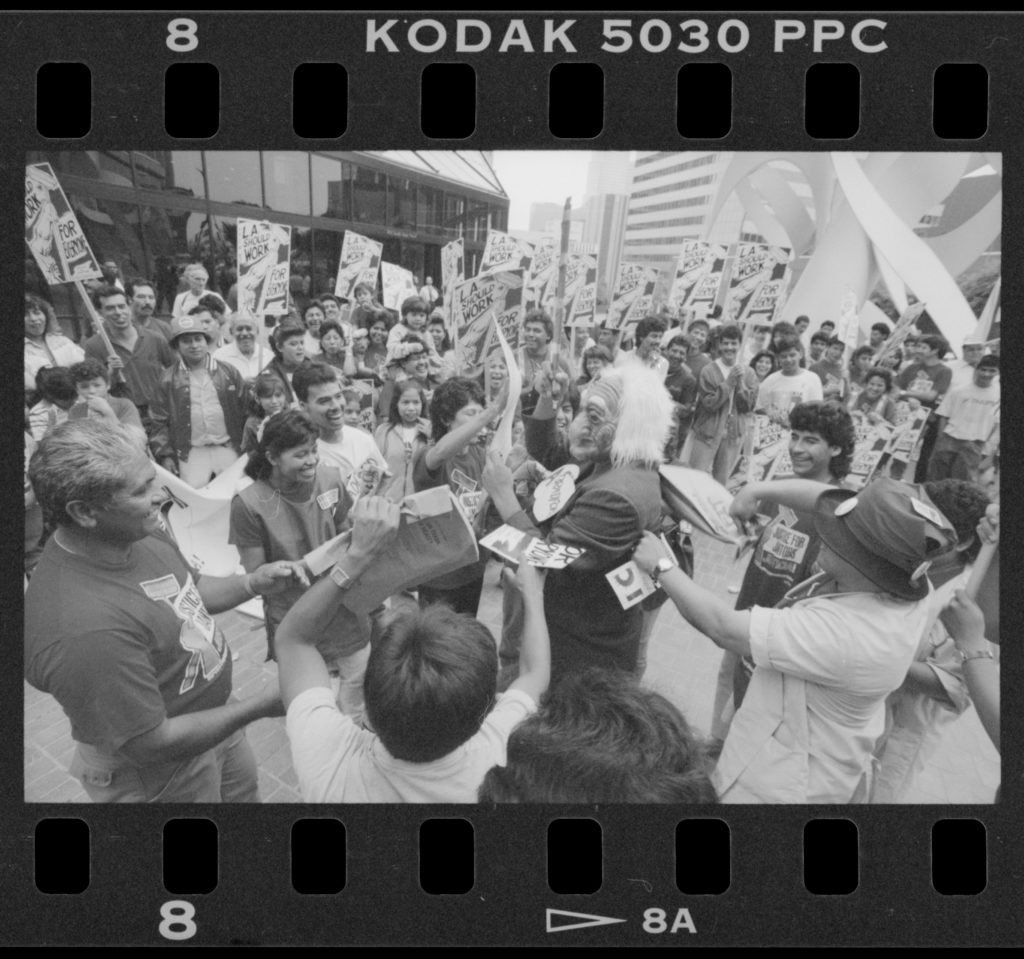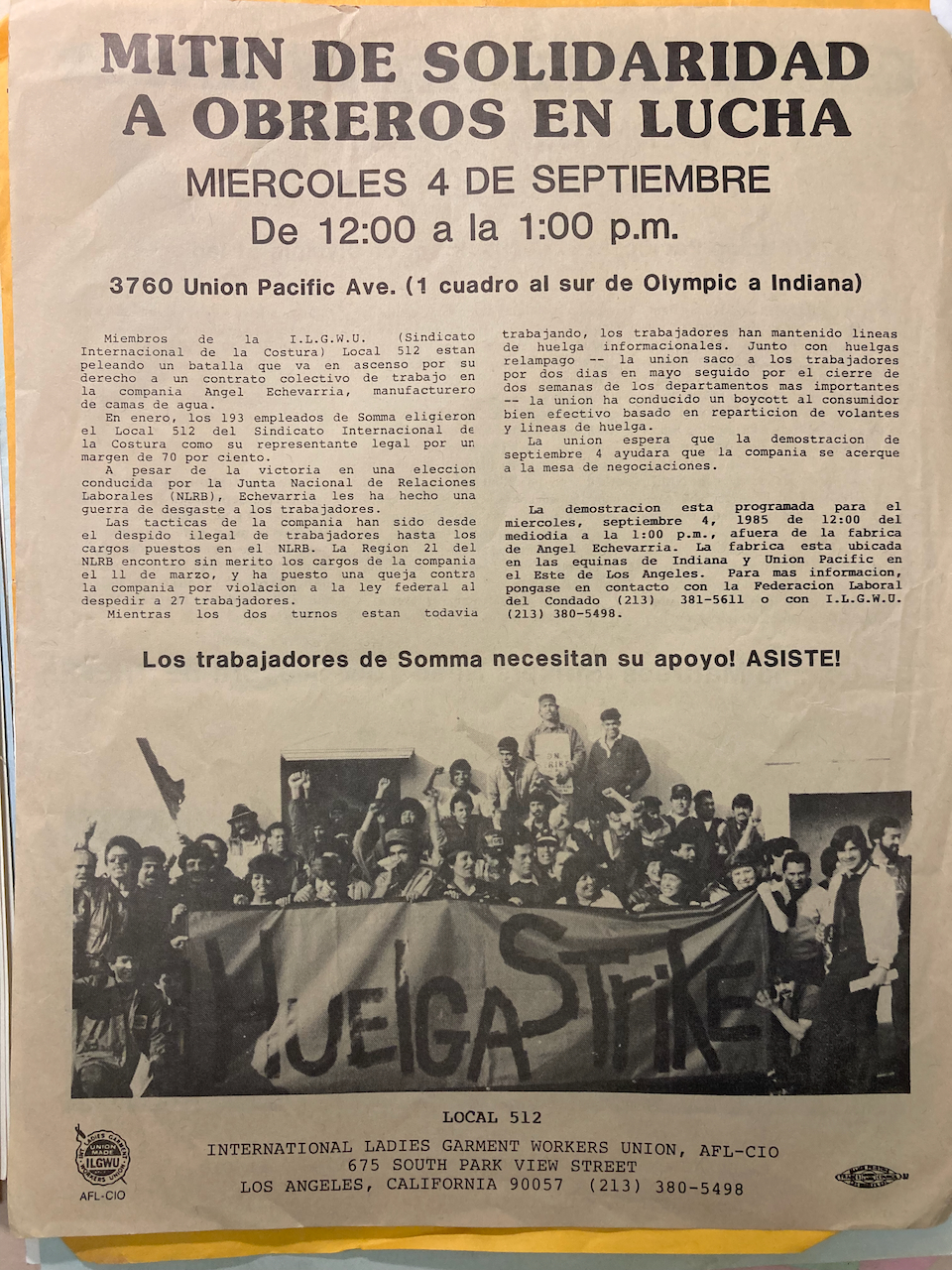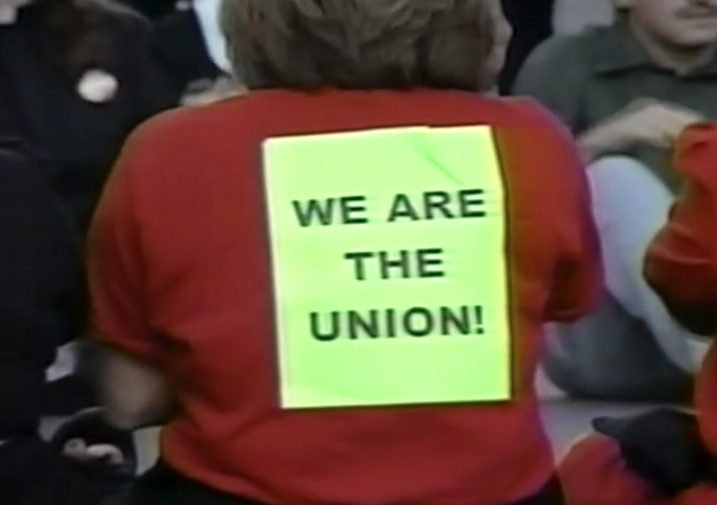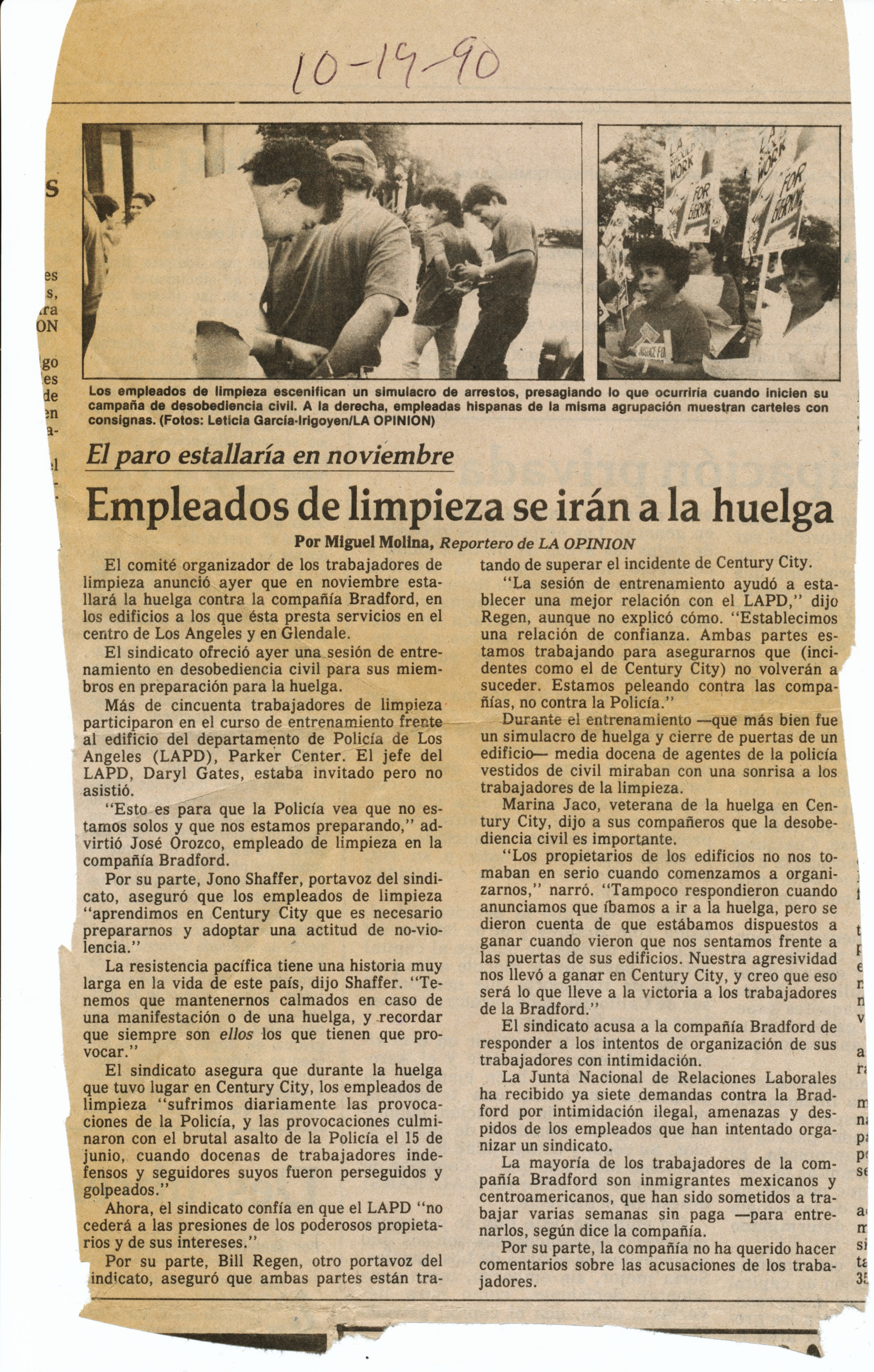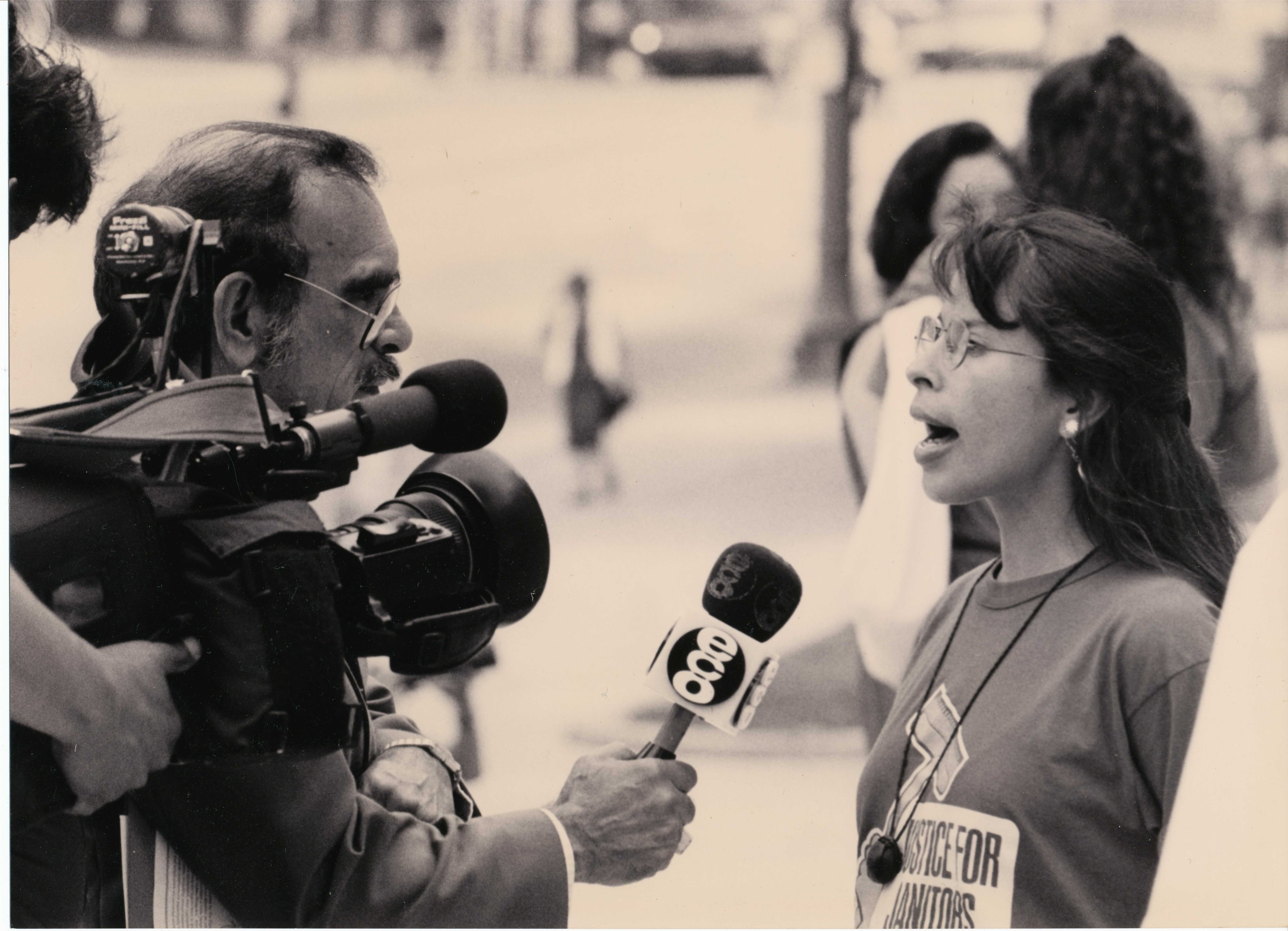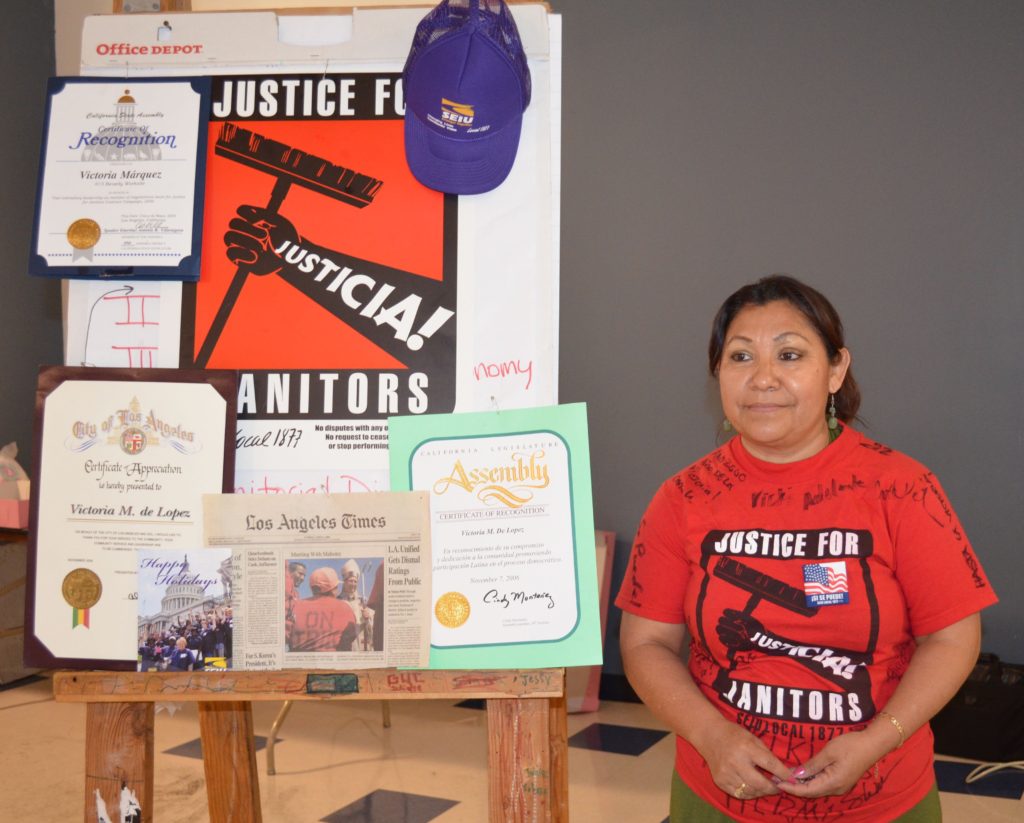Browse the Memory Work collection of photographs, documents, videos, and more.
Search by year or topic
1933 1938 1973 1978 1984 1985 1987 1990 1992 1993 1995 1996 1997 1998 2000 2006 2011 2022 2023 ACLU AFL-CIO APALA boycott CASA CIWA CLUE David Sickler Garment Workers Guatemala GWC HERE Local 11 ILGWU immigrant rights IRLE history Jobs with Peace Justice for Janitors LAANE LAPD Living Wage Campaign Los Angeles Civil Unrest of 1992 MIWON UAW UNITE UNITE HERE workers' education
Browse Remember This! Posts
-
Workers and Students: Imperfect Allies
In this 1928 essay, union organizer Sadie Goodman gives advice to middle-class college students who want to help workers. An immigrant who left school after the sixth grade to work in garment shops, Goodman became an organizer with the Amalgamated Clothing Workers of America. She attended labor college programs in the early 1920s, but was…
-
Western Summer School for Industrial Workers, 1933
In the summer of 1933, California union organizers, state education officials, and the University of California Workers’ Education program collaborated on the first Western Summer School for Industrial Workers. Later renamed the Pacific Coast Labor School, the Western Summer School was an important forerunner of the University of California Institute of Industrial Relations that was…
-
To ask for more would jeopardize what we have
Between 1933 and 1945, the University of California worked with California Department of Education and the California Federation of Labor to offer workers’ education course through the University Extension. Known first as the Western Summer School for Workers, then as the Pacific Coast School for Workers, and finally as the Pacific Coast Labor School, the…
-
ACLU News Release: Loya v. INS
In 1972-73, the Immigration and Naturalization service carried out widespread raids on workplaces, businesses, and homes in Los Angeles. The American Civil Liberties Union (ACLU) of Southern California, in collaboration with the Center for Autonomous Social Action (CASA) and other allies in the Latinx community, filed suit to stop the raids–a case that became known…
-
United Workers of Local 11 rank-and-file campaign
During the 1970s, the Hotel and Restaurant Employees union (HERE) Local 11 in Los Angeles was losing power as restaurant owners dropped their union contracts and hotels cut wages and benefits. In 1978 a multiracial group of members calling themselves United Workers of Local 11 challenged the union’s long-serving leader Scotty Allan. The group distributed…
-
Claiming the right to full union membership
In 1978 members of HERE Local 11 launched a campaign to unseat long-time union leader Andrew “Scotty” Allan. United Workers of Local 11 ran a multiracial slate of men and women committed to greater member participation in the 20,000 member union. Their candidate for the office of secretary-treasurer was Daniel Ruiz, a resident immigrant and…
-
CODIL General Assembly, June 1978
After years of fighting deportation sweeps in Los Angeles, activists associated with the Centro de Acción Social Autónomo (CASA) formed special committee to address workplace raids by the INS and to advocate for the rights of undocumented workers generally. The Comité Obrero en Defensa de los Indocumentados en Lucha (CODIL, or in English the Workers…
-
Somma waterbed workers win back pay, 1985
In 1984, workers at the Somma waterbed factory in East Los Angeles began organizing fellow workers at neighborhood soccer games and decide to join the ILGWU. Most of the workers were immigrants from Mexico and Central America, many without documentation. Their employer was Angel Echevarria, a prominent figure in the Latino community and in Los…
-
Jobs with Peace
How can progressive political movements win power in geographically expansive and multiracial cities like Los Angeles? The answer, according to the Los Angeles Jobs with Peace campaign was “coalition architecture,” an intentional strategy to link the interests of organized labor with the peace movement, the women’s movement, and the African American civil rights movement through…
-
Unions review impact of immigration reform
The AFL-CIO published this information for unions and workers in the wake of the Immigration Reform and Control Act (IRCA) of 1986. The law created a process for many undocumented residents to regularize their status, and the pamphlet highlights organized labor’s role in helping “undocumented workers attain legal status and prevent discrimination by employers.” In…
-
Seguro Medico? Si Se Puede! Mopman y Local 399 Luchando por tus Derechos!
In this cartoon from the Justice for Janitors campaign, two workers worry about the cost of healthcare. The superhero Mopman tells them that having good health insurance is like “having extra money in your pockets.” In cartoons and street theater, the character Mopman was part of the union’s strategy to reach rank-and-file janitors.
-
Police disrupt janitors march on Century City, June 1990
During a 1990 strike against cleaning contractors in the Century City office complex, Los Angeles police confront and beat janitors and their supporters. The confrontation led to a city inquiry into police officers’ actions, and a settlement between janitors and their employers. This video compilation was produced by the Service Employees International Union (SEIU) and…
-
Bruised But Not Beaten | Herridos pero no vencidos
On June 15, 1990, the LAPD armed with nightsticks attacked group of peaceful demonstrators outside Century City that included women and children. Not intimidated by police brutality, the demonstrators continued to protest until fair working conditions were given.
-
Stop the Cooperation between the Police and the INS
A flyer announcing a protest rally and march organized by the Coalition for Humane Immigrant Rights of Los Angeles (CHIRLA) in the fall of 1990. Formed in the wake of the 1986 Immigration Reform and Control Act, CHIRLA drew together organizations and activists from many communities to demand inclusion for immigrants. Reflecting growing progressive coalition…
-
Cleaning Workers to Go on Strike: October 19, 1990
A clipping of a 1990 article describing a Justice for Janitors training held in from of the Los Angeles Police Department. Janitors were preparing to use non-violent civil disobedience in their strike on Bradford Building Services in November of that year. Translated from Spanish by Juan Torres. “Cleaning workers to go on strike” La Opinion,…

